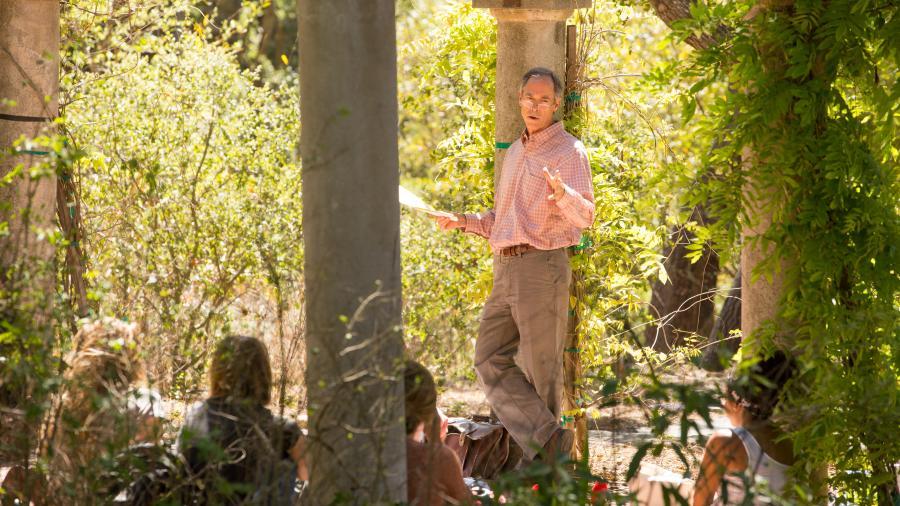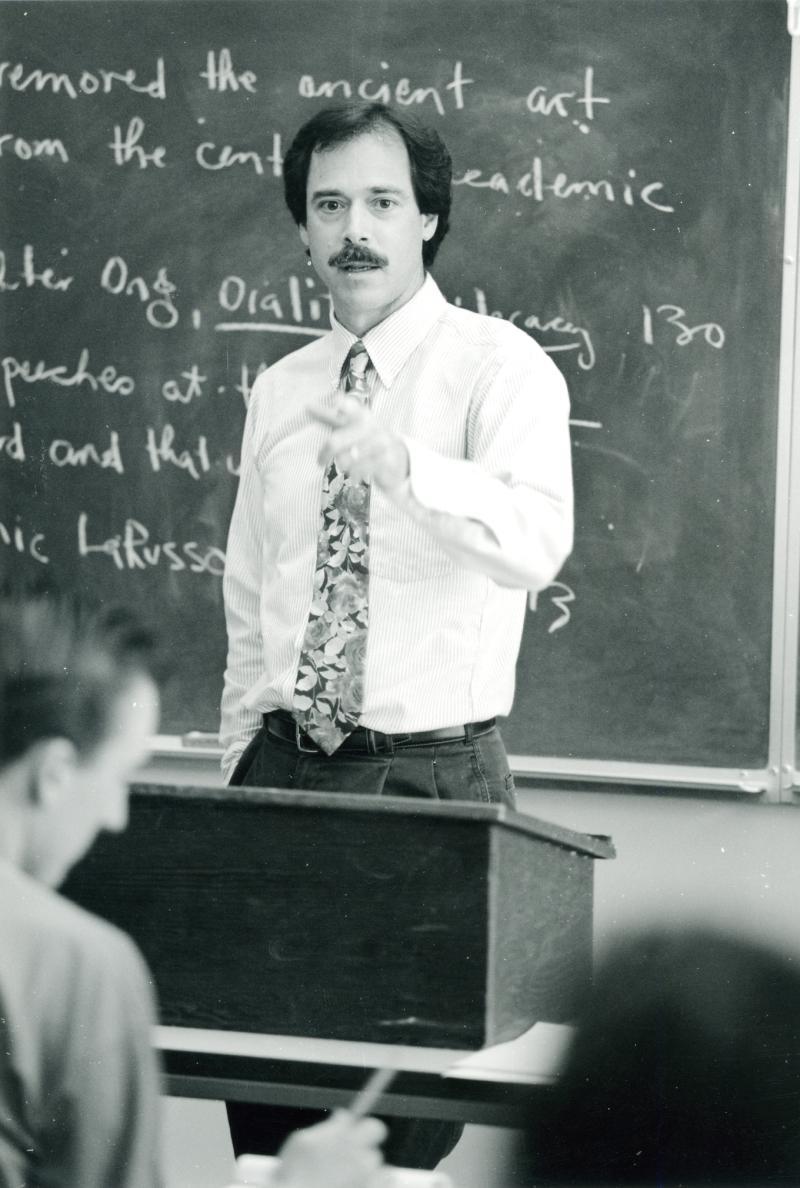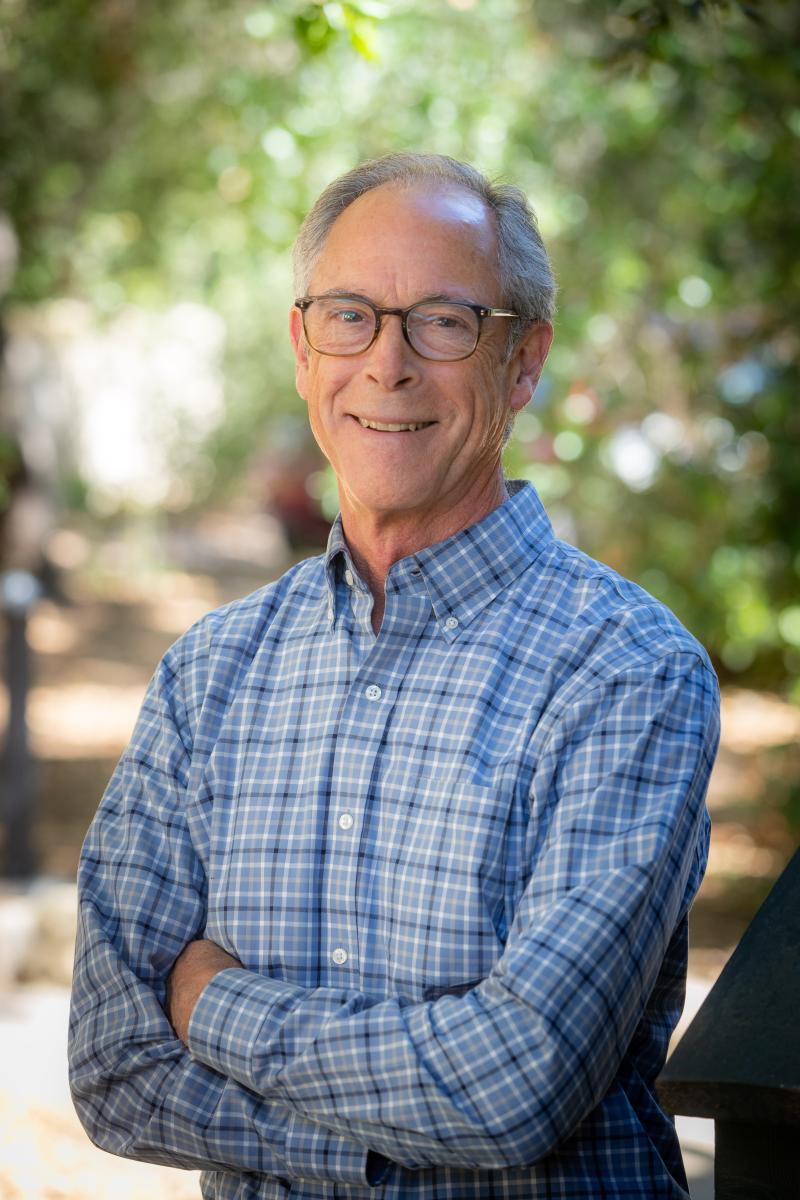Westmont Magazine A Master of Rhetoric & Relationships

Students who’ve studied rhetoric with Greg Spencer, professor of communication studies, likely recall his definition of it: “loving appropriately through speech.” His Christian faith inspires this union of love and rhetorical theory. “We tend to think of rhetoric as manipulative or bombastic speech,” Greg says. “But it really refers to the art of discourse and choosing from every material available to create communication that’s a work of art.”
He also draws on the work of classical thinkers. “They faced many of the issues we grapple with today,” Greg says. “Quintilian described rhetoric as ‘a good person speaking well.’ The great orator Cicero believed in combining eloquence with wisdom. The Romans included a sense of ethical responsibility in their definition because they thought that both the character of the speaker and the content of the speech mattered.”
For 35 years, Greg has both challenged and inspired Westmont students in courses on rhetoric and media ethics as well as the course Messages, Meaning and Culture, all critical topics during the Information Age. He retires in May.
When he teaches media ethics, Greg encourages students to view information with discernment. “In the rush to cover a breaking story, the news media may overlook ethical dimensions of story: the details in the truth, the reputations of the people involved, the importance of the ordinary instead of the sensational,” he says. “Reporters often put the story above all else, including its moral implications. Of course, this assumes people actually read the news!
“Even more insidious is advertising that pushes the edge of respectability to get noticed. Without a critical eye, we can fall into the trap of gradually accepting what we once condemned.” The growing problem with misinformation and conspiracy theories proliferating on social media and online makes it even more important to critically analyze the information we consume. “Even just thinking of ourselves as ‘consumers’ is evidence of advertising’s effect on us,” he says. “I don’t want to define myself by what I consume but by who I am as a child of God, as a person in community, as a lover of what is good.”
An enthusiastic and passionate teacher, Greg finds memorable ways to engage his students. Once a year, he and all his students don togas to discuss Plato’s arguments against rhetoric. The best presenters receive garlands, and everyone gets grapes.
On the first day he teaches about logical argument, he brings in big paper grocery bags and asks students to put them over their heads. As they sit in the dark, he reads a list of woes. “Woe to us for we are a credulous generation,” he says. “How easily we believe what we are told. How difficult we feel it is to analyze, to criticize, to search for reasons. How resistant we are to logic.”
He then lists lies society tells us:
» Sex creates true intimacy.
» The Good Life means being beautiful and having things.
» If I just change my nose/hair/lips/skin, I’ll be loved.
» As long as we think good thoughts, all will be well.
» Success is more important than faithfulness.
» I should never let my classmates catch me in a mistake.
» The Real World requires us to bury our idealism and ethics.
» Being a Christian means life will be easier because God loves me better than non-Christians.
» Non-Christians are miserable, unworthy blasphemers who can’t be trusted for insight, especially about spiritual matters.
» Wealth is a sign of God’s blessing.
» I should never look foolish, even for the sake of the truth.
» I deserve all the blessings I have.
» I am nobody.
» I am a Great Somebody.
» If we’re sincere, it doesn’t matter that we know little, that we’re incompetent, that we reason poorly.
“There are consequences to bad reasoning,” Greg tells the students. “You’re experiencing the ultimate consequence — you’re in the dark, uncomfortable, trying desperately to find a way out. Don’t be in the dark — search for the light. State one lie you tend to believe — and then take off your darkness.
“It’s a beautiful moment when they remove the bag because they take that confession so seriously. They bond as they hear others confess the lie they’ve believed.”
Greg also performs the Rhetoric Rap with Campus Pastor Scott Lisea on the last day of class. “I’ve been involved in many ridiculous Spring Sing performances — almost every year,” he says. He served as an emcee three times. Greg quotes Frederick Buechner, “If the truth is worth telling, it’s worth making a fool of yourself to tell,” to explain his teaching.
Greg discovered the blessings of the Westmont community when he arrived in 1987 after earning a doctorate in rhetoric at the University of Oregon. He and his wife, Janet, had three daughters 3 and under. Their youngest, born a month after their move, developed meningitis and spent weeks in a neonatal intensive care unit. Meanwhile, they’d bought a house in Carpinteria that required extensive renovation, and his mother died a month into the fall semester.
“While I couldn’t wait to begin teaching, we had a lot to deal with. In the midst of this stress, Academic Dean Bud Blankenbaker organized a work day at our house and brought 10 people with him. I was walking around the property weeping with gratitude. I’ve felt so blessed to be a part of this community. The fantastic Westmont faculty inspire me, call out the best of me and challenge me intellectually and spiritually.”
Greg says students have been excited about learning, and their responsiveness delights him. “The hardest thing about leaving will be no longer creating a classroom culture,” he says. “I hope to keep speaking and preaching, but it won’t be three days a week for 15 weeks in a semester.
“I almost never use the word ‘career’ to characterize my life at Westmont. I just do what I do, living my life in amazingly privileged ways before eager students. Teaching is an immensely rewarding task — it’s an electric joy when it goes well.”
In 1996, the Spencers sold their house and moved into Las Barrancas, the homes for professors next to campus. “We’ve loved living in a community with professors as neighbors and students nearby,” Greg says. “We invite every class to our house once a semester, playing games and laughing. Our Christmas drop-in ends with singing ‘The Twelve Days of Christmas’ with all the motions.”
He says students have been remarkably consistent throughout the years. But the cell phone has changed student culture the most. Because of this, he doesn’t allow either phones or laptops in the classroom. “Cell phones have changed the way we relate to people in public and in private,” Greg says. “When I first started raising concerns about cell phone behavior, students were defensive. Now they say they’re addicted and need help.”
The relationships he develops with students often continue after graduation, and Greg keeps in touch with and advises numerous alums. “Homecoming is one of my favorite days of the year,” he says. “But I had to create a button that says: ‘I’m over 60, so tell me your name.’”
He grew especially close to Patrick Steele ’97, who double majored in communication studies and economics and business. Just a few months before he graduated, Patrick suffered a debilitating injury that left him paralyzed from the neck down. Their friendship deepened as Patrick slowly recovered and began rebuilding his life even as he dealt with ongoing pain. Greg handed Patrick his diploma, traveled to Denver for one of his surgeries, and served as a groomsman at his wedding. He values the time he spent with Patrick, who died in 2017.
“Greg consistently spoke profound truths to our hearts and minds as students,” says Kristin Donaldson Overton ’90. “He caused us to contemplate questions critical not only to our academic discipline, but to life and to our relationships with God and others. He dared us to reach far beyond our goals of becoming adept communicators to deeply examine aspects of our own character and to desire holiness above all else.
“I’ve had the privilege of knowing Greg, Janet and their three beautiful girls well beyond my days at Westmont. As a student, I ate meals in their home, babysat the girls, was a frequent flyer in Greg’s office hours and reaped the benefits of Greg as a mentor as well as a professor. He advised me in both academic and personal ways, always in love and always wanting the best for me. His greatest challenge to me during my time at Westmont: Care more about learning than about earning. I’d been a perfectionist in high school. My self-worth was far too immersed in my academic abilities. Greg taught me to love learning for its own sake, a lesson that has remained with me, shaping my life and my vocation for 32 years.”
While Greg has invested time and effort into teaching, he has also written books, scholarly articles and poetry. In “A Heart for Truth: Taking Your Faith to College” (Baker, 1992), he advises first-year students as they adapt to college and seek to grow in their faith. “Awakening the Quieter Virtues” (InterVarsity Press, 2010) focuses on qualities such as discernment, innocence, generosity, authenticity and contentment. He has also authored two fantasy novels: “The Welkening” (Howard, 2004) and “Guardian of the Veil” (Howard/Simon & Schuster, 2007).
He’s working on a third novel, “Boomer Boy,” based on his experience growing up in an alcoholic home.
In 2018, the Western States Communication Association Communication and Instruction Interest Group appointed Greg Master Teacher of the year. He spoke about his teaching style, strategies and philosophies at the WSCA convention that year and participated in an open forum to answer questions.
Greg and his wife, Janet, will stay in Santa Barbara and look forward to spending time with their three daughters and six grandchildren — with two more on the way.
“The tender-hearted responsiveness of students has been an enormous blessing and highlight of my time at Westmont,” Greg says. “They’ve taught me about earnest faith and have willingly shared the depth of their lives. I’ll miss our daily interactions.”

